.webp)
Struck or Stricken? What's the Past Tense of Strike?
(This means that "strike" does not form its simple past tense or its past participle by adding "-ed" or "-d" to the base form.) The Five Forms of "To Strike" Form strike Alternative Name; Base Form: strike: Infinitive Form: The -S Form: strikes: Third Person Singular Form: Past Form: struck: Simple Past Tense:

Types of Strikes Industrial Relations/Human Resource Management/MBA Simplynotes
Here's the word you're looking for. Answer. The past tense of strike is struck . The third-person singular simple present indicative form of strike is strikes . The present participle of strike is striking . The past participle of strike is struck or stricken . Find more words!

Past Tense Of Strike Struck or Striked? (Pronunciation & Usage)
Strike in Past Perfect Continuous Tense. Singular. Plural. I had been striking. We had been striking. You had been striking. You had been striking. He/She/It had been striking. They had been striking.

Past Tense of Strike, Past Participle of Strike, V1 V2 V3 V4 V5 Form of Strike English Study Here
To form the past tense of "strike," you simply add "-ed" to the base form of the verb. For example, "I struck the ball" or "He struck the match.". It is important to note that "struck" is the only correct form of the past tense of "strike." "Striked" is not a word and should not be used. Understanding verb tenses is.
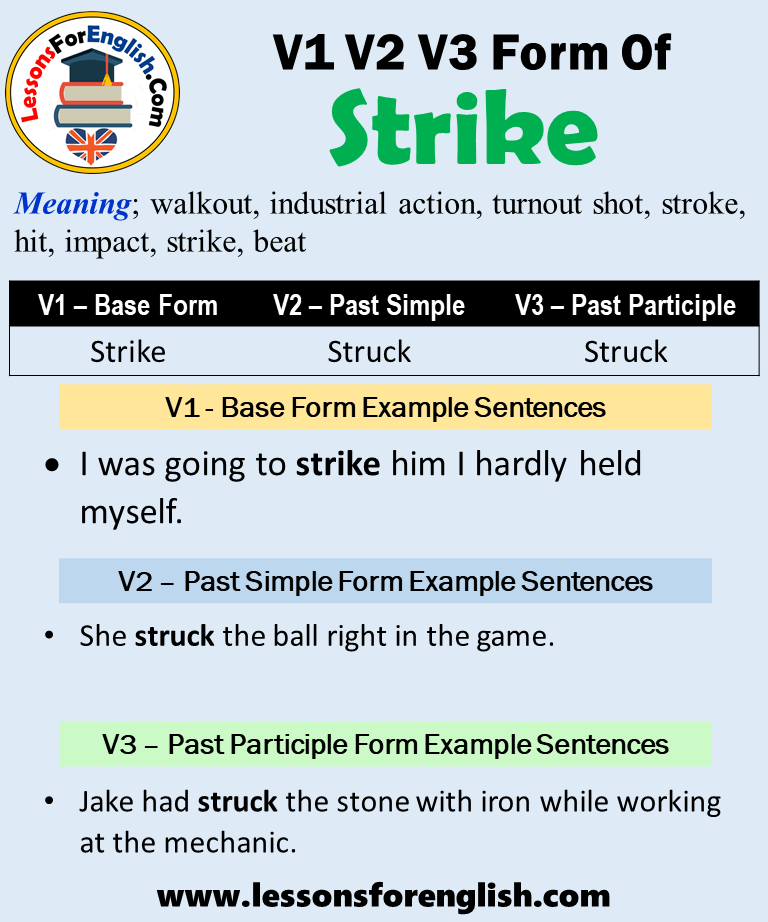
Past Tense Of Strike, Past Participle Form of Strike, Strike Struck Struck V1 V2 V3 Lessons
What is the past tense of "strike?". Most commonly, the past tense of the word "strike" is "struck.". Although the word form will change based on its participle. And the sentence where it's used. For example, referencing "strike" in the present participle form will change it to "striking," but in the infinitive form, will.
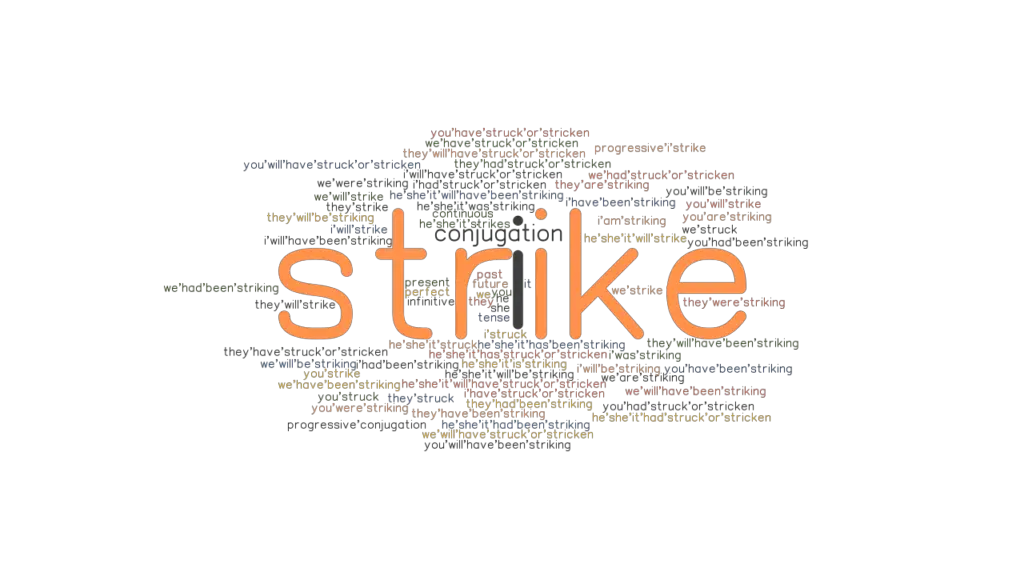
Strike Past Tense Verb Forms, Conjugate STRIKE
past participle: (to) strike striking struck, stricken: definition: in Spanish in French. Subjunctiveⓘ This verb has multiple spellings of the past participle (listed above). However, for simplicity, only 1 spelling is displayed in the compound tenses below. present; I: strike: you: strike: he, she, it: strike: we:

Strike V1 V2 V3 V4 V5 , Past Tense, Past Participle Form of Strike EnglishAwesome
STRIKE definition: 1. to hit someone or something: 2. If a thought or idea strikes you, you suddenly think of it: 3…. Learn more.
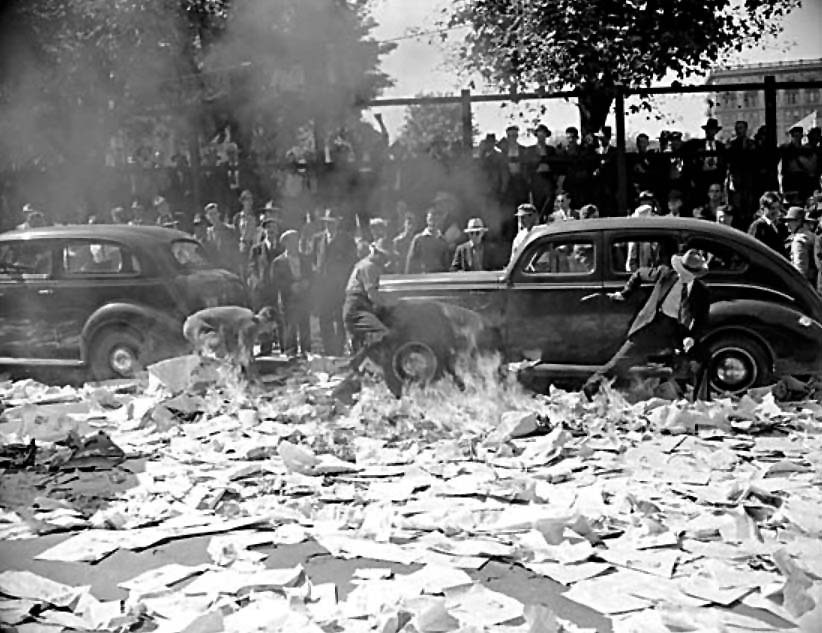
Past Tense • Province newspaper strike, 1946 The paper never...
Conjugation of verb 'Strike'. V1 Base Form (Infinitive): To Strike. V2 Past Simple: Struck. V3 Past Participle: Struck/Stricken. V4 3rd Person Singular: Strikes.

Strike past simple simple past tense of strike past participle v1 v2 v3 form of strike english
Conjugation of the verb Strike in all tenses: future, present and past. 🎮 Conjugation trainer for memorizing forms.
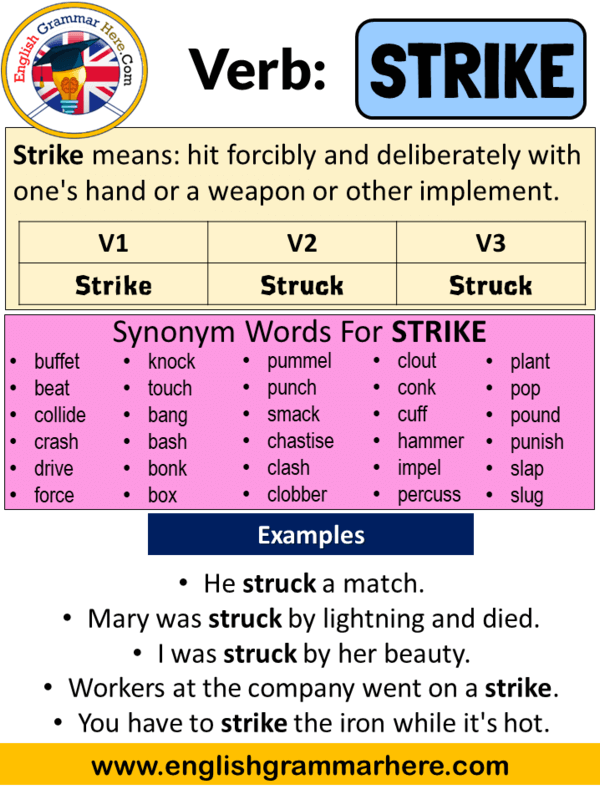
Strike Past Simple, Simple Past Tense of Strike Past Participle, V1 V2 V3 Form Of Strike
Strike is the present tense: Finally, the clock strikes. Striking is the present participle: It was striking to see. Struck is the simple past: The cyclist was struck by a car. Struck is also the past participle: I was struck by the power of theatre. Stricken is the adjectival past participle: A grief- stricken widow. .

Today in London radical history 1926 General Strike continues in parts of London, despite TUC
What Is The Past Tense Of Strike? The past tense for strike is struck.. Strike is one of more than 200 irregular verbs having their own past tense form (such as the past tense of the verb run and rise).Therefore, it is quite difficult to use the correct form strike in past tense because of the habit of adding "ed" to make words in the past form ( such as past tense of bury).

Conjugation Strike 🔸 Verb in all tenses and forms Conjugate in past, present and future
Conjugation of Strike. Simple / Indefinite Present Tense. He/She/It strikes . I strike. You/We/They strike. Present Continuous Tense. He/She/It is striking. I am striking. You/We/They are striking.

Catch Past Participle / Some Irregular Verbs Ielts Grammar Ahmednoor The English Coach Facebook
Conjugate the verb strike in all tenses: present, past, participle, present perfect, gerund, etc. English Deutsch български Ελληνικά English. strike strike back strike down strike off strike out strike through Look up "strike" in other languages Arabic Bulgarian Chinese.
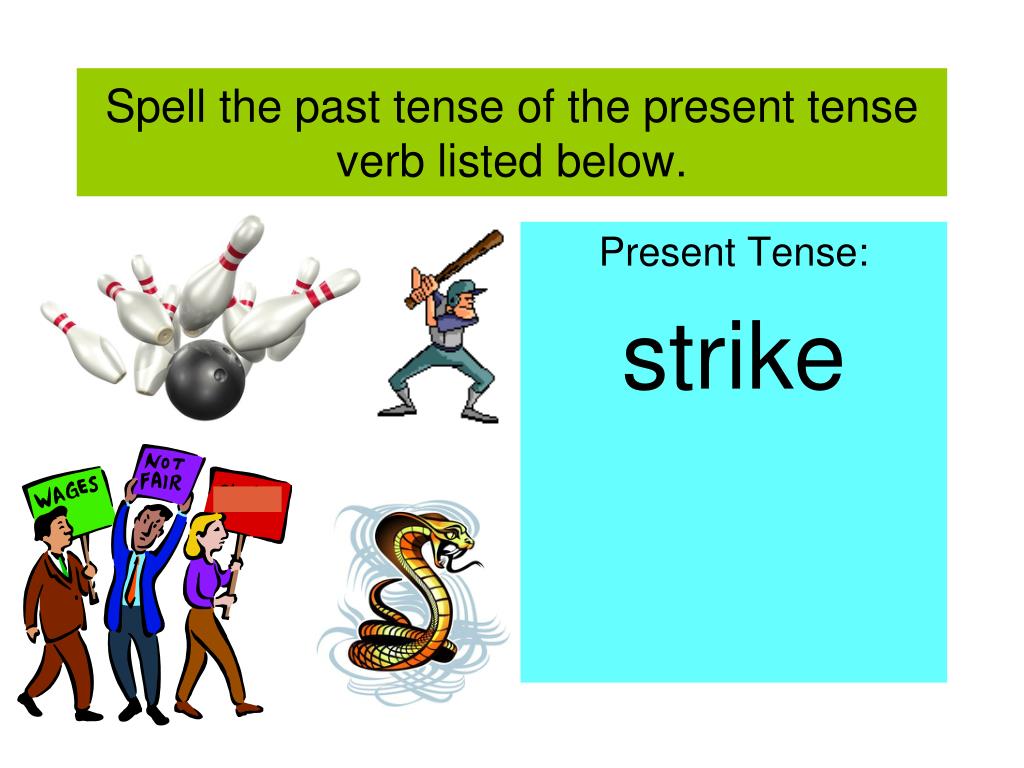
PPT Irregular Verbs Part 4 (Verbs that do not use “ed” for past tense) PowerPoint
To Strike Conjugation; To Strike Infinitive: to strike Gerund: striking Past participle: struck Simple past: struck Irregular forms Auxilliary verb Spelling change Use contractions. Positive Negative. Indicative. Positive Negative. Present. I strike I strike: you strike you strike: he/she/it strikes he/she/it strikes:

Past Tense of Strike, Present, Future and Participle form
The English verb 'strike' is pronounced as [straɪk]. Related to: irregular verbs. 3 forms of verb strike: Infinitive (strike), Past Simple - (struck), Past Participle - (struck).. Here are the past tense forms of the verb strike. 👉 Forms of verb strike in future and past simple and past participle. What is the past tense of strike.
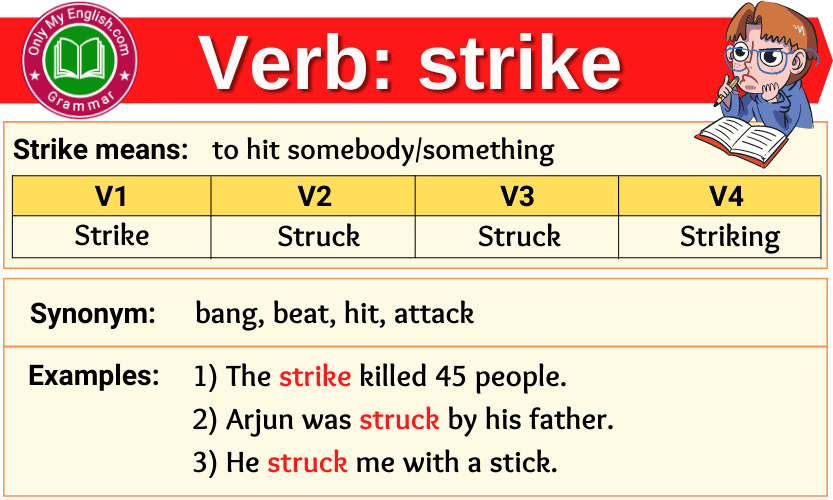
Strike Verb Forms Past Tense, Past Participle & V1V2V3 »
'to strike' conjugation - English verbs conjugated in all tenses with the bab.la verb conjugator. bab.la - Online dictionaries, vocabulary, conjugation, grammar share